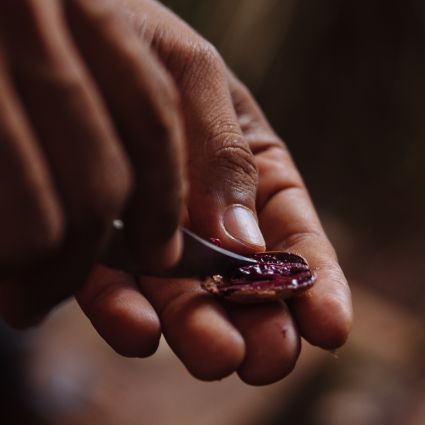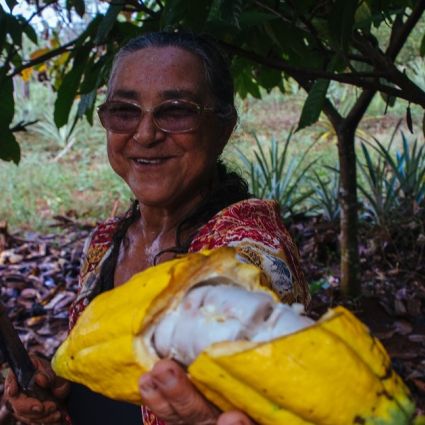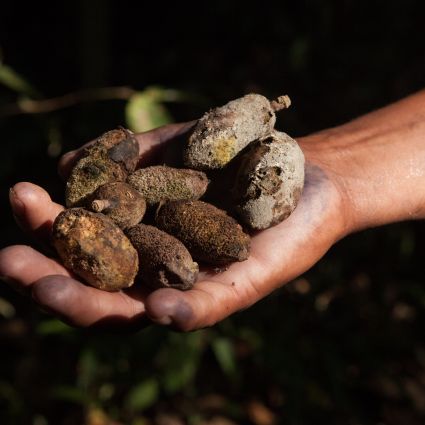A Project that has brought income to quilombola communities as well as healthy eating to students of the schools in the municipality of Oriximiná, Pará State. Florestas de Valor Program (Value Forest Program), developed by Imaflora, sponsored by Petrobras, Fundo Amazônia/BNDES, iCS, Governo do Canadá and Humanize, promotes agroecology and structure of value chains for these products. Since 2016, 88 tons of food have been supplied to 21 quilombola schools, 9 indigenous schools and 24 school in the urban area through PNAE (National School Nutrition Program - Programa Nacional de Alimentação Escolar), reaching around 20 thousand students from public schools. As a result, 47 quilombola and indigenous farmers had access to an income of R$ 555 thousand reals.
It is expected that these numbers will increase even more. Until 2017, the products included in this program were either foods in natura or with low processing, such as pumpkin, tapioca flour and beiju seco (an indigenous dish). However, the establishment of four new UBAs (Units of Benefiting Foodstuffs) enabled greater production with higher added value. From then on, a pilot-project was initiated with the production of bread made with Brazilian nut flour, which is also found in the list of food products of PNAE.
In 2018, the first UBA Tapagem was inaugurated in Flona Saracá-Taquera, having its productions allocated to the community school. In 2019, three other UBAs started operating, proving for three other schools close to the units. The production that started with 500 loaves of bread in 2018, increased to 4,400 in 2019, benefiting 628 both children and teenagers. "This pilot program has propitiated the opportunity to test several aspects related to the productive process, such as the performance of the handlers and the quality of the equipment", states Andressa Neves, Imaflora Project Assistant. "For 2020, we expect to continue supplying bread, expanding the production, and also activate other products, such as fruit pulp, chestnut flour and milk", she adds.
Aspects such as distribution capacity, logistics, quality and acceptance of foodstuffs by the students are being analyzed by the City Hall so that the amount of acquired products from the UBAs may increase and be expended to other schools. "The bread has presented great acceptance by the children", asserts Andressa.
UBAs are located in Erepecuru quilombolas territory and Trombetas area, as well as in Flona Saracá-Taquera, all of which are protected areas, benefiting the following communities: Vista Cumina, Arancua de Baixo, Jamari and Tapagem, in addition to the neighboring communities of Santa Rita, Arancuan do Meio and Curuçá Mirim. For this year, the plans are to consolidate the handlers team, license the chain of fruit pulp and plan new fluvial transport routes to expand the delivery to other locations.
"UBAs production will play several roles. From an environmental standpoint, it will provide destination to items that are wasted due to excess production, such as fruits. In addition, it will be a model of sustainable production since they are equipped with solar panels and will bring residues in separators", affirms Andressa. "From a social standpoint, UBAs is a way to value agro extrativist production. Furthermore, it is an alternative for employment and income generation to farmers and food handlers", she adds.
About Imaflora
The Institute of Forest and Agricultural Management and Certification (Imaflora) is a non-profit Civil Brazilian Association, created in 1995 under the premise that, the best way for conserve the tropical forests is to grant them an economic purpose, associated with proper management practices and a responsible management of all natural resources. Imaflora believes that the socioenvironmental certification is one of the tools to address this aspect of the challenge, both in forest and agricultural sectors, with strong power to induce sustainable local development. This way, the aim is to seek to have a positive influence in the productive chains of forest and agricultural products, collaborate in the elaboration and implementation of related public policies, and last but not least, to make a different in the region where it operates, creating usage models of the land and sustainable development that can be replicated in other municipalities, regions and biomes in the country.


